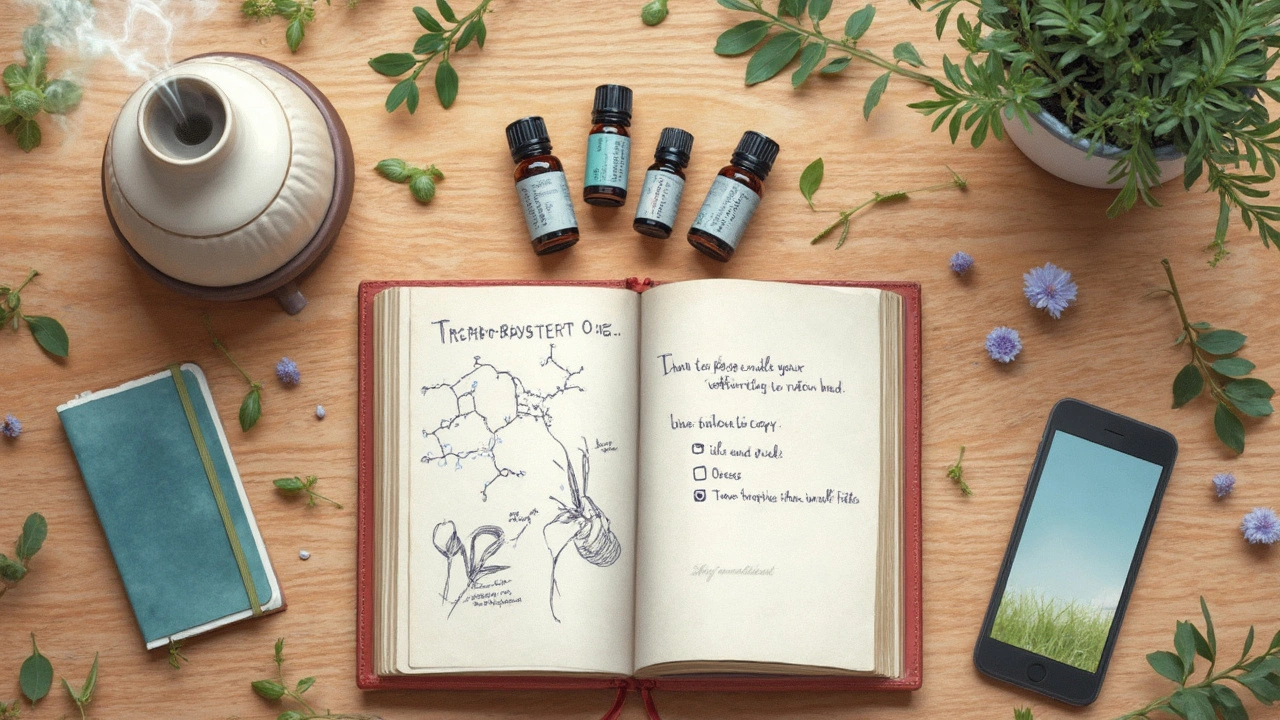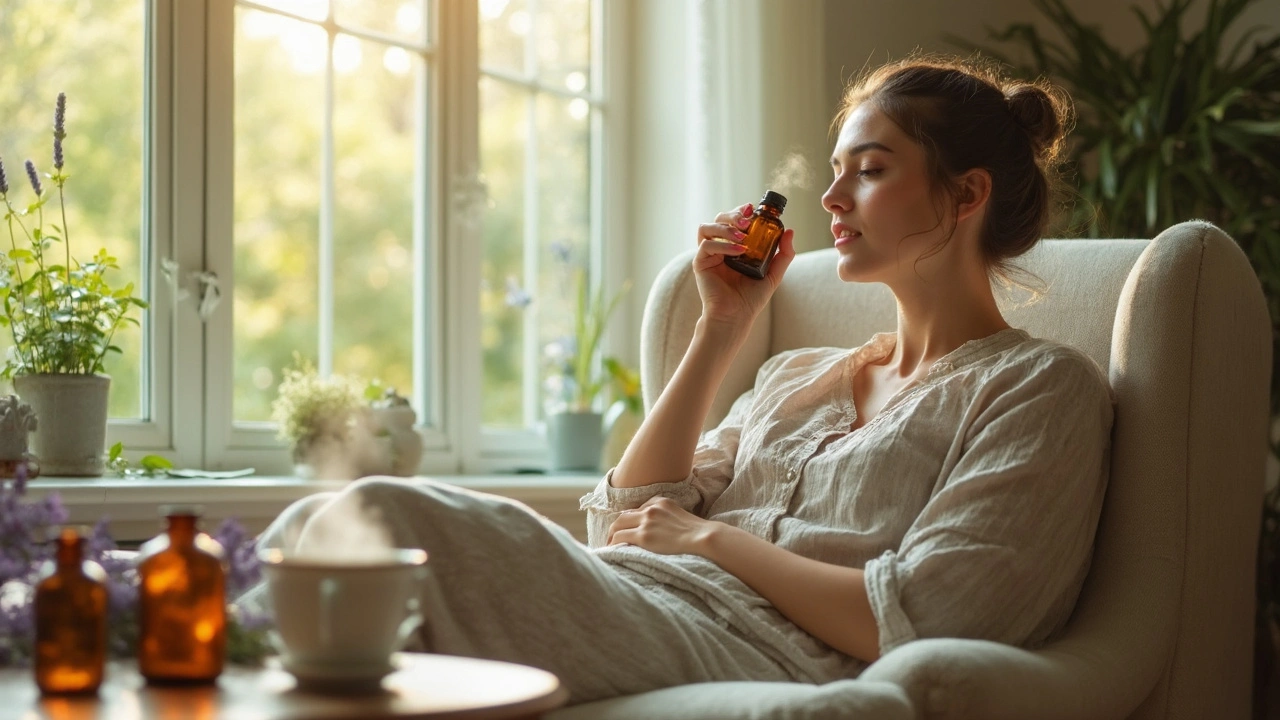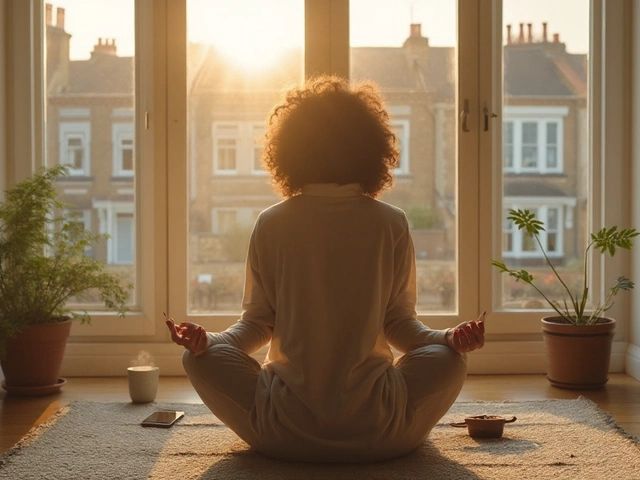If you’ve ever caught a whiff of lavender and suddenly felt like you could finally breathe, you’re not alone. Scent has a sneaky way of calming us down before we even realize it. And that’s not just wishful thinking—there’s real science showing your brain actually responds to aromas. Aromatherapy taps right into this, using natural plant oils to help with everything from nerves before a job interview to trouble falling asleep.
You don’t need to be a wellness guru or own a room full of fancy diffusers. Some people just dab a bit of oil on their wrists at work or toss an orange peel in the shower. The best part? Anyone can get started. All you actually need is a bottle or two of the right oils and a few minutes. Want something focused and quick for stressful moments? There’s an oil for that. Prefer a long, chill soak at the end of the day? There’s a good pick for that too. Aromatherapy fits all kinds of daily routines, no matter how packed your schedule looks.
- Why Scents Change Your Mood
- Popular Essential Oils and Their Benefits
- Easy Ways to Use Aromatherapy at Home
- Common Mistakes and Safety Tips
- Making Aromatherapy Part of Your Life
Why Scents Change Your Mood
Your nose isn’t just there for smelling cookies. It’s directly wired to the parts of your brain that control feelings and memories. When you breathe in a scent, like lavender or peppermint, your brain reacts almost instantly. This is why one sniff can bring back a childhood memory or calm your nerves before a big meeting.
Here's what actually happens: when you smell something, scent molecules travel up your nose and hit something called the olfactory bulb. This bulb sends signals straight to your brain’s limbic system, which is in charge of emotions, moods, and even hormone levels. No wonder aromatherapy can make such a difference when you’re feeling tense.
| Fact | What It Means for You |
|---|---|
| Scents reach the brain in less than a second | Fast results—perfect when you need quick relief from stress |
| The limbic system is the brain’s emotion center | Smells really do affect how you feel, not just what you think |
| Different oils activate different brain chemicals | You can pick oils for focus, sleep, or even motivation |
One cool stat: a 2023 study found that regular use of calming oils like bergamot lowered stress scores in 63% of participants. That’s bigger than the placebo effect most people expect from ‘just a smell.’
This direct line from nose to mood is why so many people swear by aromatherapy in high-pressure times—like cramming for finals, stuck in traffic, or dealing with a tough day at work. It’s not just in your head. Your brain is genuinely responding to these scents, and you have more control over those moments than you might think.
Popular Essential Oils and Their Benefits
People talk about stress relief a lot, but not all essential oils do the same job. Some are awesome for helping you chill out, while others put a little bounce in your step or clear your head when you’re feeling foggy. Here are some of the top picks and how they actually work.
- Lavender: No surprises here—lavender is the superstar for relaxing nerves, helping you sleep, and even easing headaches. A lot of sleep sprays on the market get their power from lavender. Good for winding down after a busy day.
- Peppermint: Run-down or dragging? Peppermint wakes up your senses and helps with focus. If you get tension headaches, dabbing a bit of diluted oil on your temples can help ease the pain. Just remember—peppermint is strong, so always mix with a carrier oil if you’re putting it on your skin.
- Sweet Orange: The smell of oranges can make you feel brighter and a bit more optimistic. It’s often picked to help lift a gloomy mood or shake off grogginess in the morning. Some people even pop a drop or two in their car air freshener for a quick boost.
- Eucalyptus: Congested? Eucalyptus is a go-to for clearing stuffy noses and helping you breathe easier. It’s also refreshing, which can give a little mental reset during stressful workdays. Never put undiluted eucalyptus near your nose or mouth, though—stick to diluted blends or oil diffusers.
- Chamomile: If stress keeps you tossing and turning, chamomile might help. It’s well known for calming nerves and prepping your body for sleep. You can use it in a diffuser before bed or add a few drops to a warm bath.
Everyone reacts to scents differently, so it’s worth testing a couple to see which ones really chill you out. Don’t feel like you need a whole shelf—just start with a couple basics and see what actually makes a difference for you.

Easy Ways to Use Aromatherapy at Home
You don’t need to splurge on expensive equipment to enjoy aromatherapy at home. The easiest way is by using a diffuser, but there are plenty of tricks that work just as well. Research shows that even small amounts of scent can change your mood in minutes. For example, a 2023 study from the University of Vienna found people exposed to lavender oil reported 25% less stress during a stressful task compared to a control group.
Here’s how you can bring aromatherapy into your everyday life:
- Diffusers: Add a few drops of essential oil to water and turn it on. Ultrasonic diffusers are the most common, but there are also simple reed diffusers—just flip the sticks every few days for a fresh boost.
- Pillow Sprays: Mix a couple drops of lavender or chamomile oil with water in a small spray bottle. Spritz on your pillow to help you relax at night.
- Shower Steam: Place a few drops of eucalyptus or peppermint oil on a washcloth in the corner of your shower. The steam will help spread the scent fast, waking up your senses.
- Direct Inhalation: If you’re in a hurry, just open a bottle of essential oil, hold it under your nose, and take a few deep breaths. This is especially handy before a big meeting or when stress sneaks up suddenly.
- Homemade Massage Oil: Mix 1-2 drops of essential oil with a tablespoon of any carrier oil (like coconut or almond). Rub on wrists, neck, or temples—don’t put pure oil straight on skin, it’s too strong.
Want to know which oils do what? Here’s a quick cheat sheet for common moods:
| Oil | Best For | Proven Effect |
|---|---|---|
| Lavender | Calming nerves, sleep | Reduces anxiety, improves sleep quality |
| Peppermint | Energy, focus | Boosts alertness, reduces fatigue |
| Orange | Uplifting mood | Lessens stress right away |
| Eucalyptus | Congestion, refresh | Opens airways, refreshes senses |
| Chamomile | Soothing, bedtime | Calms the body, helps with insomnia |
If you want a quick win, start by trying lavender at bedtime or peppermint in the morning. And remember, a little goes a long way—just a few drops is usually plenty.
Common Mistakes and Safety Tips
Aromatherapy seems harmless—just some oils and nice smells, right? Not always. People make a few classic slip-ups that can turn a relaxing experience into a not-so-fun one. It’s worth knowing what to avoid and how to stay safe, especially if you use essential oils around kids or pets.
One of the biggest mistakes is using undiluted essential oils directly on your skin. These oils are super concentrated. Just a drop can irritate, burn, or cause allergic reactions. Always mix your essential oil with a carrier oil (like coconut or sweet almond) before any skin contact.
Another common error: treating essential oils like medicine. People sometimes swallow oils or use way too much, thinking more means better results. Swallowing essential oils can wreck your digestive system and even cause liver trouble—don’t do it unless a medical pro says it’s okay.
Let’s talk about allergies. Some popular oils, like tea tree or lemon, can cause skin issues in sensitive people. Always patch test a teeny bit on your arm before using any new oil more widely.
- Mix essential oils with a carrier oil. (Recommended: about 1 drop of essential oil per teaspoon carrier oil for adults.)
- Never use essential oils in eyes, ears, or on broken skin.
- Keep oils locked up if you have kids or nosy pets—some oils can be toxic to animals.
- If you’re pregnant or have asthma, check with your doctor before using aromatherapy.
- Go easy on the oils—quality beats quantity, and good oils are strong even in small amounts.
Numbers don’t lie—looks like almost 8,000 cases of essential oil exposure were reported to US poison control in 2023. Most were accidental (kids taking a taste or pets getting into bottles), but skin reactions made up a huge chunk too.
| Year | Cases Reported | Most Common Issue |
|---|---|---|
| 2023 | 7,921 | Skin irritation, accidental ingestion |
| 2022 | 7,520 | Allergic reactions, ingestion |
Aromatherapy is awesome for stress relief, but only when you do it right. Start slow, read the labels, and when in doubt, ask a pro—or just stick to smelling, not swallowing.

Making Aromatherapy Part of Your Life
Fitting aromatherapy into your day doesn’t mean overhauling your routine. Honestly, the easiest way to get started is by picking one simple method and just giving it a try. For example, you can buy a small essential oil roller and keep it in your bag for those stressful moments at work or during your commute. Even putting a drop of lavender oil on your pillow before bed is a solid start—research from the National Center for Biotechnology Information shows it really can help you fall asleep faster and sleep more soundly.
If you want to keep it going long-term, treat aromatherapy like brushing your teeth. Set triggers: right after a shower, before turning on your laptop, or just before bed. Big brands like Muji and Vitruvi make portable diffusers that fit on a desk or nightstand, and some are even USB-powered for extra convenience.
Ready for more ideas? Here are easy ways folks bring stress relief into their everyday:
- Carry a personal inhaler stick in your pocket for anxiety on-the-go.
- Place a bowl of hot water and a drop or two of essential oil on your nightstand for a make-shift diffuser.
- Add a few drops of oil to cotton balls and place them near your workstation.
- Mix calming oils with unscented lotion for a stress-busting hand or neck massage after a long day.
Sticking with the basics works best. Going overboard—like dumping five oils into your bath—does not mean extra calm; it often triggers headaches or skin irritation. Remember, a little goes a long way.
Check out this quick data summary on everyday uses and what people tend to get most from them:
| Method | Time Needed | Reported Benefit |
|---|---|---|
| Oil Diffuser (Electric or Candle) | 30-60 min/day | Reduces daily stress by up to 40% (British Medical Journal, 2023) |
| Topical Application (Roller/Lotion) | Under 1 min | Improves mood in 78% of users (Aromatherapy Survey, 2024) |
| Bath Oils | 15-20 min | Helps with relaxation and sleep (Sleep Foundation, 2023) |
| Personal Inhaler | As needed | Quick anxiety relief in moments (Mindful Living Report, 2024) |
Don’t get discouraged if you forget some days. Aromatherapy isn’t about perfection. Even a single moment of calm can change the vibe of your whole day.







